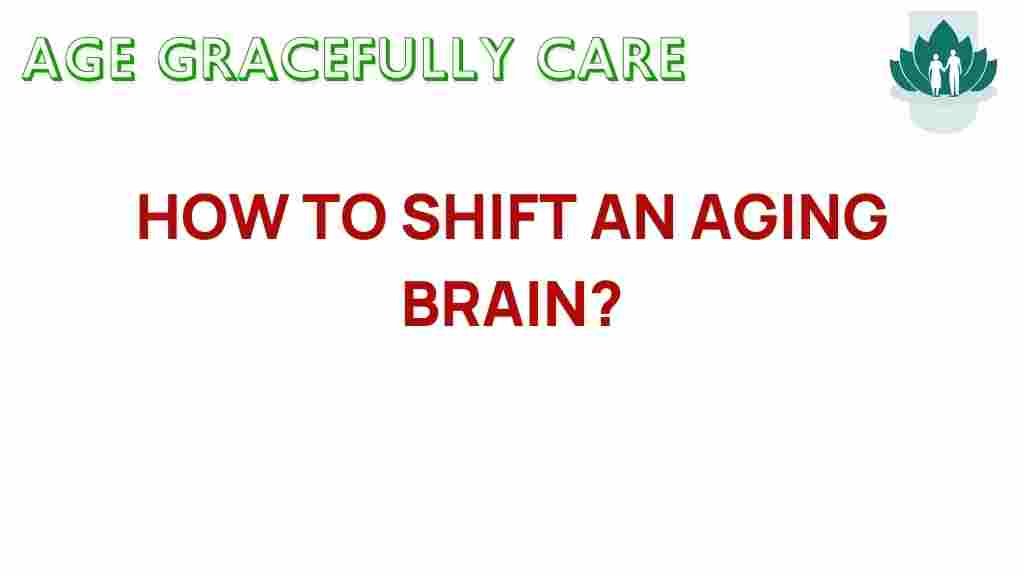Unlocking the Secrets: How to Shift an Aging Brain for Optimal Health
The concept of an aging brain often evokes concerns about cognitive decline, memory loss, and diminished mental agility. However, recent research in neuroplasticity has opened up new avenues for enhancing cognitive health even as we age. This article will delve into effective strategies for maintaining a vibrant brain, including brain exercises, lifestyle changes, and memory enhancement techniques that promote healthy aging.
Understanding the Aging Brain
As we age, our brains undergo various changes that can impact our cognitive abilities. However, understanding these changes is the first step towards optimizing our brain health. Here are some key points to consider:
- Neuroplasticity: The brain’s ability to reorganize itself by forming new neural connections. This means that even in older age, we can improve our cognitive function.
- Cognitive Decline: Common issues such as slower processing speeds and memory lapses can occur, but they are not inevitable.
- Mental Agility: The capacity to think quickly and efficiently can be preserved and enhanced through specific activities.
The Importance of Cognitive Health
Maintaining cognitive health is crucial for a fulfilling life. It influences our ability to engage with the world, solve problems, and retain memories. By focusing on brain health, we can enhance our quality of life in our later years. Below are some essential strategies to shift an aging brain and foster optimal health.
Step-by-Step Process for Enhancing Brain Health
1. Engage in Brain Exercises
Just like our bodies, our brains need exercise to stay fit. Here are some effective brain exercises to enhance memory and cognitive function:
- Puzzles and Games: Engage in crossword puzzles, Sudoku, or brain-training apps that challenge your reasoning and problem-solving skills.
- Learning New Skills: Pick up a new hobby or learn a musical instrument. This stimulates different areas of the brain and promotes neuroplasticity.
- Mindfulness and Meditation: Practices that focus on breathing and present-moment awareness can improve focus and mental clarity.
2. Adopt Healthy Lifestyle Changes
A balanced lifestyle is vital for healthy aging. Here are some lifestyle changes that can positively affect your brain health:
- Nutrition: A diet rich in antioxidants, healthy fats, and vitamins supports brain function. Consider incorporating:
- Leafy greens
- Fatty fish (rich in omega-3 fatty acids)
- Berries (high in antioxidants)
- Nuts and seeds
- Physical Activity: Regular exercise increases blood flow to the brain and encourages the growth of new neurons.
- Sleep Hygiene: Prioritize restful sleep, as it is essential for memory consolidation and overall brain health.
3. Practice Social Engagement
Social interactions are crucial for maintaining cognitive function. Engaging with friends and family can provide emotional support and stimulate mental activity. Here’s how to enhance your social life:
- Join Clubs or Groups: Participate in community activities or join clubs that align with your interests.
- Volunteer: Helping others can give a sense of purpose and keep your mind active.
- Stay Connected: Use technology to maintain relationships with loved ones, especially if they live far away.
4. Monitor Your Mental Health
Your emotional well-being is closely tied to cognitive health. Managing stress and addressing mental health issues is essential for an aging brain. Consider these tips:
- Seek Professional Help: If you experience feelings of anxiety or depression, consult a mental health professional.
- Practice Stress-Reduction Techniques: Techniques such as yoga, deep breathing exercises, or tai chi can help manage stress.
5. Use Technology Wisely
Technology can be a powerful ally in promoting brain health. Here are some tools you can utilize:
- Brain-Training Apps: Use apps designed to challenge your cognitive abilities.
- Online Courses: Enroll in online courses to learn new topics that interest you.
- Virtual Reality: Explore VR experiences that stimulate cognitive function and memory.
Troubleshooting Tips for Common Concerns
While implementing these strategies, you may encounter challenges. Here are some common issues and how to overcome them:
1. Difficulty Staying Motivated
It can be tough to stay motivated when trying to enhance cognitive health. Here are some solutions:
- Set Achievable Goals: Establish small, realistic goals that lead towards larger objectives.
- Track Your Progress: Keeping a journal of your activities can help you see improvements over time.
2. Overwhelm from Information
With so much information available, it can be overwhelming. Here’s how to simplify:
- Focus on One Change at a Time: Choose one lifestyle change or brain exercise to implement before adding more.
- Seek Guidance: Consider consulting a health professional for personalized advice.
3. Lack of Resources
Sometimes, the lack of resources can hinder your efforts. Here’s what you can do:
- Explore Free Resources: Many online platforms offer free brain training exercises or educational materials.
- Utilize Local Libraries: Libraries often have resources and programs aimed at enhancing cognitive health.
Conclusion
In conclusion, unlocking the secrets of an aging brain for optimal health is within reach. By engaging in brain exercises, adopting healthy lifestyle changes, and staying socially active, you can enhance your cognitive health and promote neuroplasticity. Remember, it’s never too late to make a change, and every small step counts towards better brain health. Start today, and embrace the journey of healthy aging with vigor and enthusiasm.
For more tips on maintaining brain health, check out this comprehensive guide. And to delve deeper into the science of neuroplasticity, visit this informative resource.
This article is in the category Health and created by AgeGracefullyCare Team
